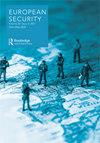Dreams Lab: assembling knowledge security in Sino-Dutch research collaborations
IF 3.6
2区 社会学
Q1 AREA STUDIES
引用次数: 0
Abstract
ABSTRACT Amid concerns over the rivalry between Washington and Beijing, the discourse and practice of knowledge security have become prevalent in Europe. This is especially true with regard to Sino-Western research collaborations on emerging technologies. Despite the scientific and economic benefits, these collaborations are increasingly perceived as a potential threat in the context of broader concerns with so-called hybrid threats. Knowledge security has emerged as a key term to identify and mitigate the risk of espionage, unwanted knowledge transfers, censorship, and the misuse of dual-use technology. To understand knowledge security and its implications, the article offers a qualitative, in-depth case study of Dreams Lab in the Netherlands: an AI research project run by the University of Amsterdam and the Free University of Amsterdam and funded by the Chinese company Huawei. Li’s practices of assemblage are used as an analytical framework to answer the question: how and why a diverse group of actors were brought together to respond to Dreams Lab and govern scientific knowledge on emerging technologies? By analysing the discourse and practice of knowledge security, the article offers crucial insights into how the great power rivalry is shaping scientific research and the international exchange of knowledge and technology.Dreams实验室:在中荷研究合作中整合知识安全
在对华盛顿和北京之间竞争的担忧中,知识安全的话语和实践在欧洲变得普遍。在新兴技术的中西研究合作方面尤其如此。尽管这些合作具有科学和经济效益,但在对所谓混合威胁的更广泛关注的背景下,这些合作越来越被视为一种潜在威胁。知识安全已经成为识别和减轻间谍活动、不必要的知识转移、审查和滥用两用技术风险的关键术语。为了理解知识安全及其影响,本文对荷兰的梦想实验室进行了定性、深入的案例研究:这是一个由阿姆斯特丹大学和阿姆斯特丹自由大学运营、由中国公司华为资助的人工智能研究项目。李的组合实践被用作一个分析框架来回答这个问题:如何以及为什么一个不同的参与者群体被聚集在一起回应梦想实验室并管理新兴技术的科学知识?通过分析知识安全的话语和实践,本文对大国竞争如何影响科学研究和国际知识技术交流提供了重要见解。
本文章由计算机程序翻译,如有差异,请以英文原文为准。
求助全文
约1分钟内获得全文
求助全文

 求助内容:
求助内容: 应助结果提醒方式:
应助结果提醒方式:


